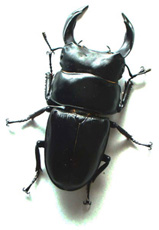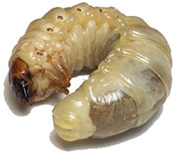(1/12) Antifreeze protein (AFP) is a unique cryoprotectant that facilitates cold survival of fish, insects, plants, and microorganisms living in icy environments [1, 2, 3]. The above left and middle are a stag beetle adult form (Dorcus hopei binodulosus) and its final instar larva that synthesizes a “hyperactive AFP" [4]. This beetle equips an overwintering nature and lives for 3-5 years. The larva is not frozen when preserved at -5°C for 24 hours [4 supplementary]. The right figure is a model structure of the hyperactive AFP of this beetle (movie), for which location of linearly arrayed waters [5] is speculated (blue spheres are the O-atoms). Significantly, this water arrangement is adopted in a single ice crystal, implying that AFP is a biomolecule accompanying a small ice crystal on its surface. The following pages try to explain how AFP works. (->next) (->home) |
|



